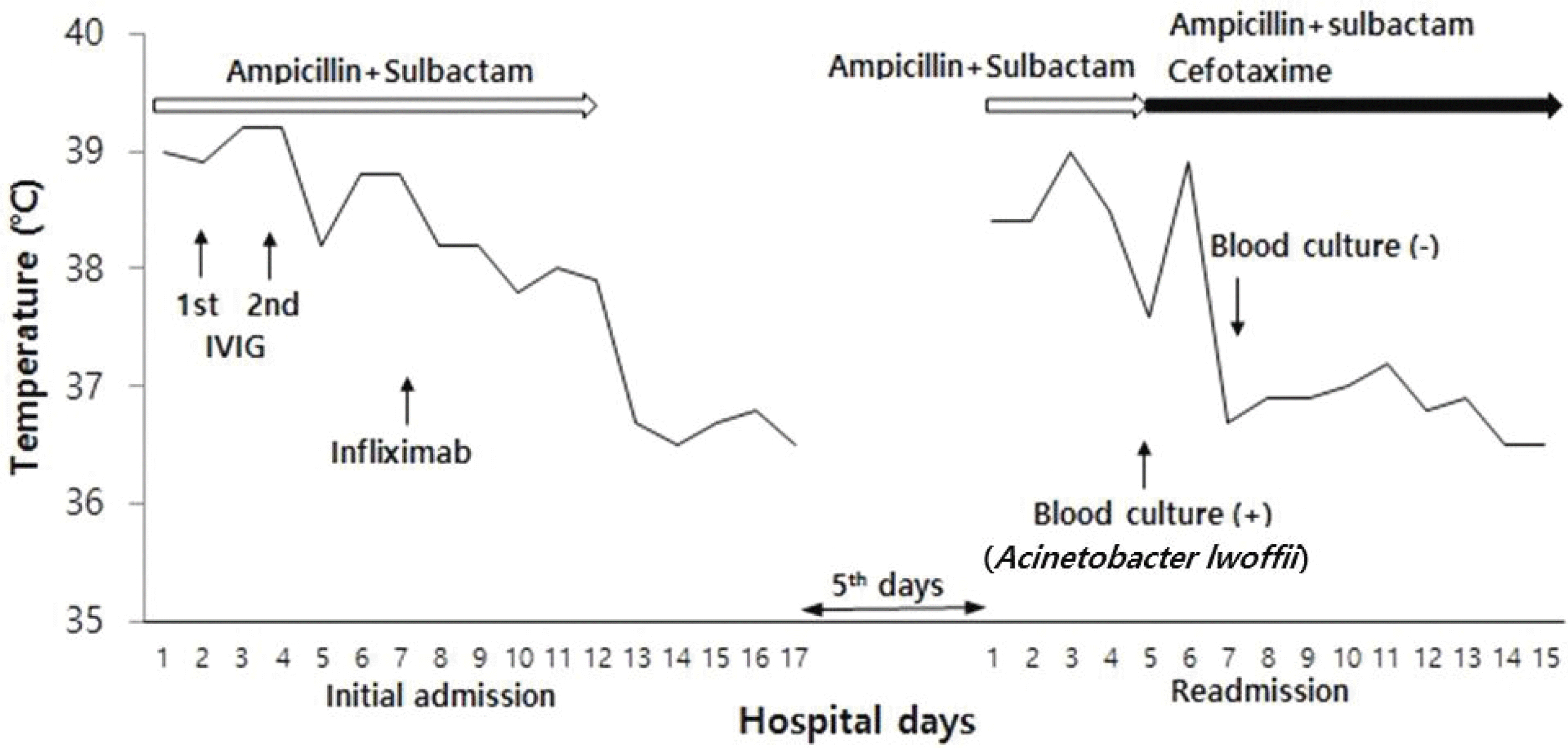Abstract
Kawasaki disease (KD) is an immune-mediated disease which is a leading cause of acquired cardiovascular disease in developed country. Recently, tumor necrosis factor-alpha (TNF-alpha) blocker, infliximab has been considered a promising option for patients with refractory KD. Although chronic use of a TNF-alpha blocker could increase risk of opportunistic infections, a few studies have documented that use of infliximab was safe without serious adverse effects in patients with KD. We observed serious bacterial infection after infliximab treatment in an infant with refractory KD. Our patient was a 5-month-old male infant diagnosed with KD who did not respond to repeated doses of intravenous immunoglobulin. We effectively treated him with a single infusion of infliximab (5 mg/kg), but gram-negative (Acinetobacter lwoffii) septicemia developed after infliximab infusion. Therefore, we report a case of serious septicemia after treatment with infliximab, and suggest considering the risk of severe infection when deciding whether to prescribe infliximab to an infant with refractory KD.
Go to : 
References
2. Newburger JW, Takahashi M, Burns JC, Beiser AS, Chung KJ, Duffy CE, et al. The treatment of Kawasaki syndrome with intravenous gamma globulin. N Engl J Med. 1986; 315:341–7.

3. Burns JC, Capparelli EV, Brown JA, Newburger JW, Glode MP. Intravenous gammaglobulin treatment and retreatment in Kawasaki disease. US/Canadian Kawasaki Syndrome Study Group. Pediatr Infect Dis J. 1998; 17:1144–8.
4. Sundel RP, Burns JC, Baker A, Beiser AS, Newburger JW. Gamma globulin re-treatmetn in Kawasaki disease. J Pediatr. 1993; 123:657–9.
5. Furukawa T, Kishiro M, Akimoto K, Nagata S, Shimizu T, Yamashiro Y. Effects of steroid pulse therapy on im-munoglobulin-resistant Kawasaki disease. Arch Dis Child. 2008; 93:142–6.

6. Burns JC, Mason WH, Hauger SB, Janai H, Bastian JF, Wohrley JD, et al. Infliximab treatment for refractory Kawasaki syndrome. J Pediatr. 2005; 146:662–7.

7. Bongartz T, Sutton AJ, Sweeting MJ, Buchan I, Matteson EL, Montori V. Anti-TNF antibody therapy in rheumatoid arthritis and the risk of serious infections and malignancies: systematic review and metaanalysis of rare harmful eff ects in randomized controlled trials. JAMA. 2006; 295:2275–85.
8. Yu HJ, Lee SJ, Sohn S. Infliximab treatment for a patient with refractory Kawasaki disease. Korean J Pediatr. 2006; 49:987–90.

9. Adriana H, Tremoulet , Sonia J. Infliximab for intensification of primary therapy for Kawasaki disease: a phase 3 randomised, double-blind, placebocontrolled trial. The Lancet. 2014; 83:1731–8.

10. Shin JI, Lee JS, Choi JY, Kim DS, Girish M, Subramaniam. Refractory Kawasaki disease: infliximab or methotrexate therapy? Indian J Pediatr. 2009; 76:1184.
11. Parashette KR, Makam RC, Cuffari C. Infliximab therapy in pediatric Crohn's disease: a review. Clin Exp Gastroenterol. 2010; 3:57–63.
12. Matsubara T, Furukawa S, Yabuta K. Serum levels of tumor necrosis factor, interleukin 2 receptor, and inter-feron-gamma in Kawasaki disease involved coronaryartery lesions. Clin Immunol Immunopathol. 1990; 56:29–36.
13. Burns JC, Best BM, Mejias A, Mahony L, Fixler DE, Jafri HS, et al. Infliximab treatment of intravenous im-munoglobulin-resistant Kawasaki disease J Pediatr. 2008; 153:833–8.
14. Mori M, Imagawa T, Hara R, Kikuchi M, Hara T, Nozawa T, et al. Efficacy and limitation of infliximab treatment for children with Kawasaki disease intractable to intravenous immunoglobulin therapy: report of an open-label case series. J Rheumatol. 2012; 39:864–7.

15. Maini RN, Taylor PC. Anti-cytokine therapy for rheumatoid arthritis. Annu Rev Med. 2000; 51:207–29.

16. Miyamoto H, Miura T, Morita E, Morizaki Y, Uehara K, Ohe T, et al. Fungal arthritis of the wrist caused by Candida parapsilosis during infliximab therapy for rheumatoid arthritis. Mod Rheumatol. 2012; 22:903–6.
17. Keane J, Gershon S, Wise RP, Mirabile-Levens E, Kasznica J, Schwieterman WD, et al. Tuberculosis associated with infliximab, a tumor necrosis factor alpha-neutralizing agent. N Engl J Med. 2001; 345:1098–104.
18. Kroesen S, Widmer AF, Tyndall A, Hasler P. Serious bacterial infections in patients with rheumatoid arthritis under anti-TNF-alpha therapy. Rheumatology (Oxford). 2003; 42:617–21.

19. Stratakos G, Kalomenidis I, Papas V, Malagari K, Kol-lintza A, Roussos C, et al. Cough and fever in a female with Crohn's disease receiving infliximab. Eur Respir J. 2005; 26:354–7.

20. Leung DY, Meissner C, Fulton D, Schlievert PM. The potential role of bacterial superantigens in the pathogenesis of Kawasaki syndrome. J Clin Immunol. 1995; 15:11S–7S.

21. Bergogne BE, Towner K. Acinetobacter spp. as nosocomial pathogens: Microbiological, clinical, and epidemiologic features. Clin Microbiol Rev. 1996; 9:148–65.
Go to : 




 PDF
PDF ePub
ePub Citation
Citation Print
Print



 XML Download
XML Download